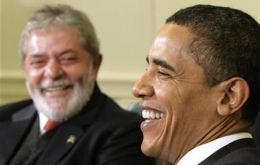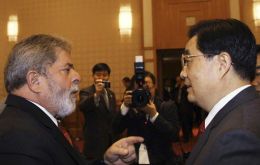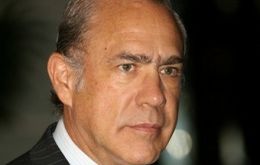MercoPress. South Atlantic News Agency
Stories for April 2009
-
Saturday, April 4th 2009 - 10:53 UTC
Chilean conservative presidential hopeful leads opinion poll

Chilean conservative presidential hopeful Sebastián Piñera is ten percentage points ahead over Eduardo Frei the ruling coalition candidate for next November’s election according to the latest public opinion poll released Friday.
-
Saturday, April 4th 2009 - 10:46 UTC
Falklands’ fan among 350 chosen students to meet leaders at NATO summit

President Barack Obama singled out a Bulgarian university student who published an article on the functioning of democracy in the Falkland Islands, to take part in a youth forum during the NATO summit in Strasbourg reports Sofia news agency, Novinite.com.
-
Saturday, April 4th 2009 - 09:50 UTC
Guess who the most popular politician on earth is

United States President Barack Obama, wildly popular the world over, said he isn't the globe's most admired politician: the title belongs to Brazil Lula da Silva
-
Saturday, April 4th 2009 - 09:45 UTC
Brazil and China discuss bilateral trade in Real and Yuan

Brazilian President Lula da Silva said Friday that he supports alternatives to the dollar as the world's premier currency who anticipated the issue will be addressed when he visits China next month. Senior Chinese and Russian officials have talked in recent weeks about a new reserve currency to replace the dollar.
-
Saturday, April 4th 2009 - 09:43 UTC
With tax breaks, March auto industry sales in Brazil are record

Auto industry sales in Brazil soared in March as consumers flocked to dealers to benefit from government tax breaks, according to data from the national dealers’ association Fenabrave.
-
Saturday, April 4th 2009 - 07:08 UTC
Mercosur experts elaborate plan to address dengue epidemic

Mercosur sanitary experts met this week in Asuncion, Paraguay to address the mosquito transmitted dengue disease which is affecting all countries of the region (except Uruguay and Chile) with tens of thousand cases confirmed.
-
Saturday, April 4th 2009 - 07:07 UTC
US unemployment in March reaches 8.5%

Another 663.000 United States workers lost their jobs in March, slightly more than the 658.000 that had been expected. The US unemployment rate has now hit 8.5%, up from 8.1% in February. Earlier this week, the IMF said it expects the unemployment rate in the developed world to nudge above 10% in 2010.
-
Saturday, April 4th 2009 - 07:01 UTC
Former Chavez ally and now opponent arrested on corruption charges

Former Venezuelan Defence minister General Raúl Baduel accused President Hugo Chavez of ordering his detention to try to intimidate him and insisted he's innocent of corruption charges which are politically motivated.
-
Saturday, April 4th 2009 - 05:16 UTC
Uruguay de-listed from group of non cooperative tax havens

The Organization for Economic Cooperation and Development, (OECD) welcomed on Thursday the formal endorsement by Uruguay of its tax information exchange standards.
-
Saturday, April 4th 2009 - 02:18 UTC
A Brazilian oil carnival?

How much access western energy firms win to Brazil’s vast offshore oil fields hinges on complex political currents in the country – and how well the companies navigate these, argues Juliet Hepker.
